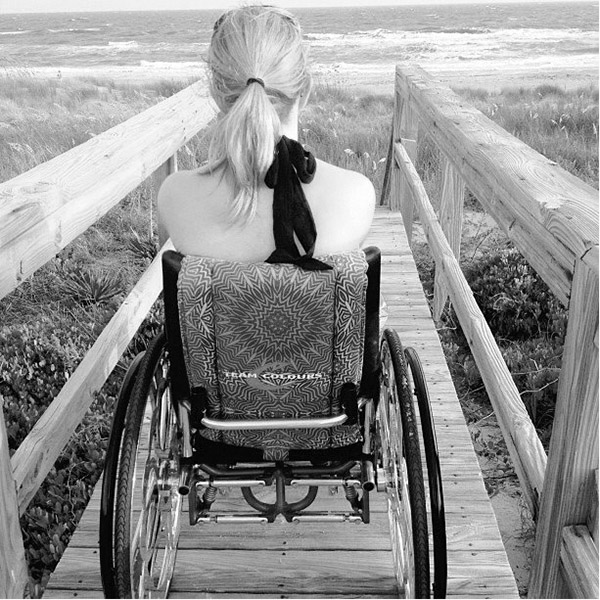Epilogue
I was submerged again, but this time it was peaceful, even though the force of the waves in the ocean was tossing me around. I couldn’t swim because I couldn’t move, and yet I felt really calm. I’d been offered a life jacket, but I declined. Having grown up in the ocean, I knew how to hold my breath while I was underwater. With my eyes closed, a few feet under, motionless, I thought back to the accident. It was the floating upward toward the surface that reminded me of that day. I was underwater for what felt to be about the same amount of time—ten seconds. I knew if I had to wait more than five more seconds for someone to grab me, I would have serious problems. I felt confident someone would be there. I had a smile on my face this time. I wasn’t remotely afraid. I had that one-second inkling of a thought: Do they know where I am in this big ocean? I’d overcome a lot during the past three years, but this experience was a major win for me.
I was underwater, deep in the ocean, because I’d been thrown from my bright green surfboard after riding a wave. I got the opportunity to surf from an organization called Life Rolls On, run by Jesse Billauer. He was a pro surfer, and years ago he went headfirst into a sandbar and broke his neck. He sold me my board and all the equipment to make it adaptive for my injury, such as the straps normally used for kiteboarding. I was able to break it in that day. The Life Rolls On team was all around me, so I felt safe. Before we left the sand, they taught me how to lie on my stomach, propped up on my elbows, which were tucked into a pocket on the board. They showed me how to lean with my body to control the board. Then they helped me get on the board and out into the ocean, where the waves would take over. I had two safety measures offered: I could wear a life jacket and I could have someone ride with me. If I were able-bodied and trying to surf for the first time, I wouldn’t have accepted either one. So for my first ride on a surfboard, I ignored my injury and declined both.
Part of the reason I said no to the life jacket was that it was a little more awkward and bulky, but also because of image. It was much less badass. I didn’t want to be covered in floating devices. I’m an ocean girl, born and raised. Even this injury wasn’t going to put me into a life jacket in my playground. Not a chance. I was going for it. I trusted that the team would come and swoop me up as promised, and in the meantime I’d let the water safeguard me while I held my breath.
There I was, propped up on my new board, with six or seven people around me in the water, on a surfboard for the first time in my life. They had to help me get over the waves. Able-bodied surfers dip their heads under the waves as they make their way out. These guys helped pull me up and over each approaching one. The water splashed in my face and I loved it.
I got out just past the break, and the waves were coming in pretty hard. I was excited but not afraid. The team turned me around, had me facing the shore, and then some of them swam away, back to shore. Just before they pushed me onto a wave, they said, “Okay, ready?” Then one person on either side of me gave me a push. I tried not to fall off, but I did. I didn’t quite have the hang of the board; it was an advanced board, which required some getting used to. I realized my error and figured out the proper way to balance myself once I got back on, by sitting a little higher up on my elbows, with my head up to take a bit of the weight off.
They asked again, “Okay, ready?” I said, “Yup.” And they shoved me off and I caught that wave. It was an amazing feeling. I can’t remember how long I rode it before getting overturned, but I felt so happy. The water splashed, and I was moving pretty darn fast because I could feel it on my face.
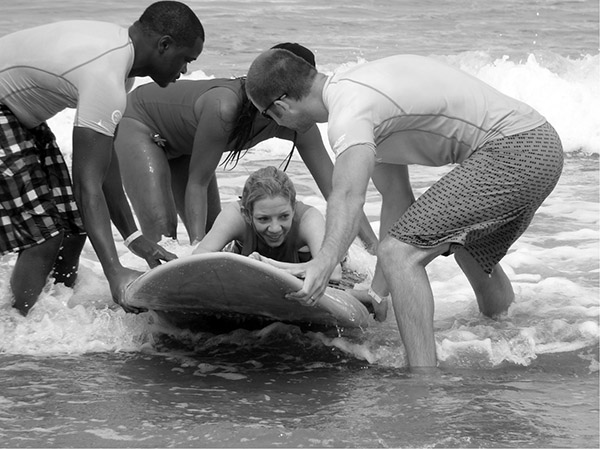

I am determined to overcome the accident. That’s a certainty. But I want to be clear that there is an enormous difference between showing positivity and being content with my injury. Just because I work hard and live a full life doesn’t mean it’s okay with me. I often get concerned that my outlook masks the hardship people like me face all the time and also potentially diminishes any urgency for finding a cure. We can be happy and independent despite our injuries, but this is by no means the life any of us would have chosen for ourselves.
This kind of disability is portrayed very differently than something like cancer, which has more urgency for a cure. I want a cure for this, too, right now. Choosing to be strong and triumphant may make us appear as though we’ve outsmarted our injury and battled it with a great outlook, but behind closed doors we suffer terribly. Our fight is 24/7 and will be for the rest of our lives. We’re a force, too. According to the United Spinal Association, a spinal cord injury (SCI) happens in the United States every forty-one minutes. That adds up to about 12,000 new injuries per year. There are 1.2 million people in the world who currently suffer from an SCI.
I’ve heard people on a certain reality show that highlights people in wheelchairs say they love life in their wheelchair and they wouldn’t go back. While I love what that show does for the community and how it breaks stereotypes, I don’t agree with that sentiment. I’d go back if I could. I’d give anything to go back. I hate that my body has turned against me, and that the nerve pain soaks up a lot of my time every day. Mentally, you can be strong to survive an accident; you have to be. You can laugh at all the antics and challenges, and you can have love and support. But at the end of the day, the basic facts of this injury can’t be willed away with positive thinking and a great outlook. An injury like this is expensive. To be clear, a newly injured quadriplegic requires between $400,000 and $700,000 in healthcare and treatment. After the initial hospital and rehab work, the follow-up costs are about $100,000. I can’t afford this, and I know most people in my position can’t. Insurance covers some things, but the 20 percent I have to pay is still beyond my means.
I’ve always been a fairly liberal-minded person, and I cared about politics even when things didn’t affect me directly. I was concerned about human rights and education, but I wasn’t really aware of the crisis we face as a nation with regard to healthcare. I’d been young and healthy up until the point of my accident. My parents are young and healthy. Chris and my friends, too. We faced a very expensive crisis after the accident.
The hospital was expensive, and the bills are still stacked up and waiting to be paid. They’re not from my original stay so much but from my continuing doctors visits. It’s so difficult and overwhelming trying to keep up with everything. Rehab, which I really need, is out of reach. I can’t afford to go; just paying the premium on healthcare for us is all we can afford. I was watching the Democratic and Republican national conventions, right around the time I was working on bolstering my Twitter numbers, and I started having conversations with people online, arguing about healthcare. Suddenly my life and my well-being are totally affected by politics.
I’m not eligible for Medicaid. If I were, I’d get a caregiver to help me. That’s because I made about $28,000 at my job, so I now earn 60 percent of that through long-term disability. That tiny income combined with Chris’s state teaching income would make the monthly deductible around $1,000. We don’t have that much money. We can’t afford that. I’ve been fortunate to have had some great organizations pay for stints of care. Walking with Anthony, for example, sent me to this really great place called Project Walk in Carlsbad, California. Medicaid would provide regular rehab, which I can’t afford. If the healthcare situation were different in this country, my mom could move back home with my dad and still have her job, and I could get the treatment I need.
Originally, following the accident, I had inpatient rehab at the hospital, which was covered through insurance. After that I received only twenty days of rehab a year. Once those twenty days were up, I didn’t get anything additional. I was trying to relearn every aspect of my life, and I had the same coverage as someone who had torn their knee. Rehab costs about $400 an hour until I meet my $3,000 deductible. There’s no way I can afford that—not many people can.
Chris teaches middle school, so we’re on the state health plan. The cost to cover me alone is $625 per month. That’s just for the premium, before the deductible or out-of-pocket expenses. When we were on TV before we got married, the misconception was that we were scheming the system, trying to qualify for Medicaid, and that’s why the wedding was on hold. It wasn’t a scheme. We were researching our care options; it was sad, of course, that we had to consider our union in terms of how it might affect health coverage.
One of the worst comments I ever read related to the healthcare drama was that I was a “parasite.” Someone read my story of love, loyalty, and overcoming adversity and that’s what he decided. This person thought that if I married, I wouldn’t qualify for Medicaid and it was all part of a big master plan to milk the system.
I was just out of college, without enough work experience to qualify for Social Security Disability Insurance, and the deductible to receive Medicaid would have been much higher than my insurance premium of $625 a month. The irony was that I didn’t qualify deductible-free, even as a single woman. I couldn’t afford what I would have had to pay. But people were writing nasty comments all over the Internet, saying that I was attempting to abuse the system by putting the wedding on hold. It’s as if people assumed that being disqualified from benefits meant that we were perfectly financially capable of going on with our lives without them. But it wasn’t like healthcare treatment was some sort of luxury item. Did they think I’d rather be milking the system or able-bodied, working a full-time job, walking, and never needing a doctor? Well, the answer is obvious. And please, who knows any middle school teachers with disabled wives who are getting rich off all that government healthcare?
Six months after breaking my neck, someone even called me “lazy” for not working. Six months! I hadn’t even received my fitted wheelchair yet. We were scrambling for some semblance of order, making it up day by day as we went along, but they would see me on TV and think, “She should get to work.” I hadn’t even figured out how to go to the bathroom, and apparently I was lazy. Before I was injured, I was anything but lazy. I went to college because I wanted a career. I worked fourteen hours a day before the accident and would give anything to do so again. I paid for college. I am still paying for college.
But even more recently, people have uttered horrible comments about the fact that we shouldn’t be allowed to have children. We are doing what all parents-to-be do. We’re assessing our finances, planning for our child’s future, and making sure we can afford to have a baby. We are lining up the support system of our family, which we are grateful to have, and we’re going to make our dream come true. The child will be paid for and cared for by us, so it’s really no one else’s business. Just because I’m in a wheelchair doesn’t mean I’m going to be a bad mother. I’m going to be a great mother, just like many women in wheelchairs already are.
The bottom line is that in this country healthcare is a mess. We shouldn’t have to think so hard about whether to go to the doctor because we can’t afford it. Everyone I have to see is a specialist. I’m a spinal cord injury patient. Every healthcare decision I make is financially motivated.
But what I can do from all of this is defend people who are disabled. I read these comments and respond because I feel like it’s my job to stand up to the ignorance and mean-spirited words people write. If they are saying I shouldn’t have kids, I’m defending myself on behalf of everyone in my situation because I have the platform to do so. I take it personally and am offended for all of us—the entire society in my situation and the situation with healthcare itself. The ignorance keeps people down. And that really pisses me off.
I don’t cry about it, but I become very angry. I wish people would have the guts to say things to my face, so I could more specifically shut them down. But sitting behind a computer, commenting on a thread, is weak. They think I have no voice there, but I do here.
I have developed another voice, too, in all of this, but it’s not a good one. It’s my own and it’s the one that talks to me alone. I know we all judge ourselves. I did even when I was extremely fit, but there’s been a lot I have had to accept with this new body of mine, and it’s been difficult. I am a new person now. Realizing that has been the ultimate challenge, but I have done it as best as I can. I went from being a lifeguard to being watched over like a child with floaties. I used to teach aerobics and light weightlifting to seniors, and now here I am struggling with two-pound weights, a shadow of the active and athletic girl I once was.
When I was in college, I took a class called inclusive recreation. We had to complete volunteer hours that were relevant to the course, so I chose to assist with the annual adapted sports day at ECU. It was a program that allowed people with all kinds of disabilities to try out different adapted sports and activities. I vividly remember trying out wheelchair tennis. I couldn’t wait until it was my turn to get into the wheelchair and hit some balls with a wheelchair user. I don’t think many people can say that they’ve done that kind of class and then ended up a quad.
I’ve almost taken on a new identity. I used to define myself by that active part of my life, and suddenly it has all disappeared. My grace and ability to dance dissolved in the water. I am like a rag doll moving to music—no more hip-hop classes, no more ballroom dancing lessons. My hands are balled up, and my legs have atrophied.
It has been difficult to accept a deteriorated appearance, too, not just deteriorated function. I didn’t expect so much atrophy. It’s happened to not only the muscles in my legs, but also the muscles in my chest—and that means my boobs. I’ve gone from having a solid B-cup to buying bras in the kids’ section. My feet swell up like balloons, too. My hair used to fall out in chunks and sometimes I had to wear wigs. I have to hide a lot with leggings and tunics and boots. A lot of sexiness was taken away, but I work on making sexy a state of mind. I work with what I have, and I try to make myself feel good about things. Sometimes just a little eyeliner and lip gloss change my day.
I can’t say I love this new body because I’d be lying. That’s a happy universe that I have not reached, and in reality I may never get there. I will say that I have made a huge effort to define my love for myself based on what’s on the inside. I think once you start really loving who you are, your confidence and positive vibes will be apparent to those around you. And you know what’s really sexy? Confidence. I was kind of a sexpot before my injury, so it has really been about getting my sexy back and reclaiming that confidence that I believe allows me to show my inner vixen again. That’s not specific to women who are injured. It’s something women in general should remember.
That’s why I want to tell people who complain about superficial things to cut themselves a little break. I was fit, but I picked myself apart and focused on the negative things about my body, not the positive. We always judge ourselves, whether we’re a supermodel or not. If I knew then how awesome and flat my stomach was, I would have gone easier on myself. I’ve had to accept, too, that without the use of my hands, I can’t do my own hair. That is at the top of the list of things I wish I could do. Britney still comes over sometimes to help me with my hair. She lives close enough that she can do that, and I love that she’ll stop by if I need her. I have figured out with the bending of my wrist how to grip cosmetics enough to actually do my own makeup. It wasn’t easy to master, and some days I didn’t look exactly like I wanted to, but now I’d say I do a pretty darn good job.
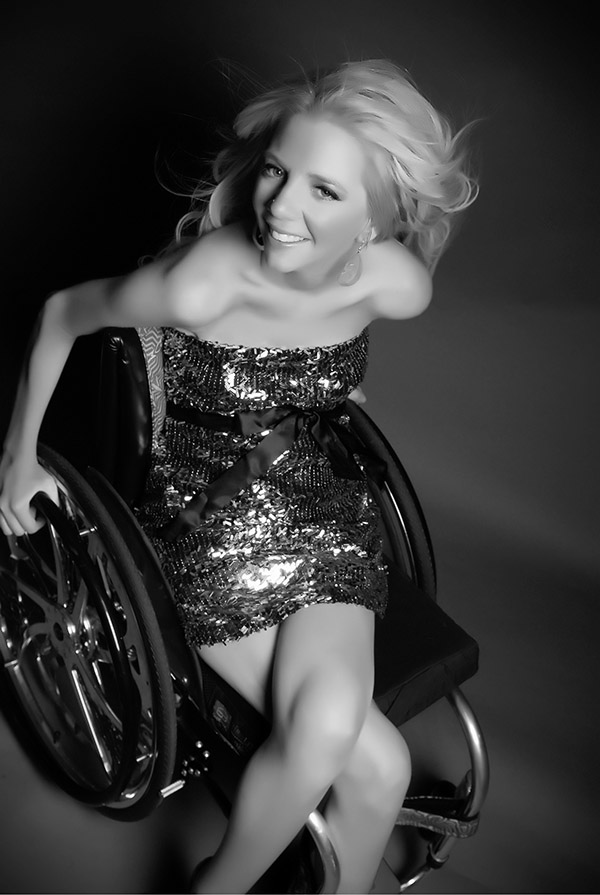
© Revolution Studios of North Carolina
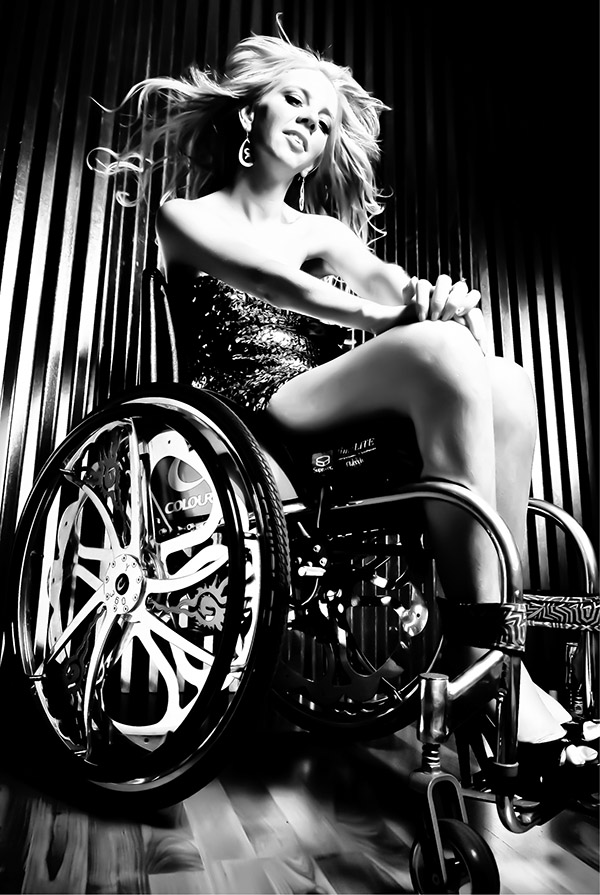
© Revolution Studios of North Carolina
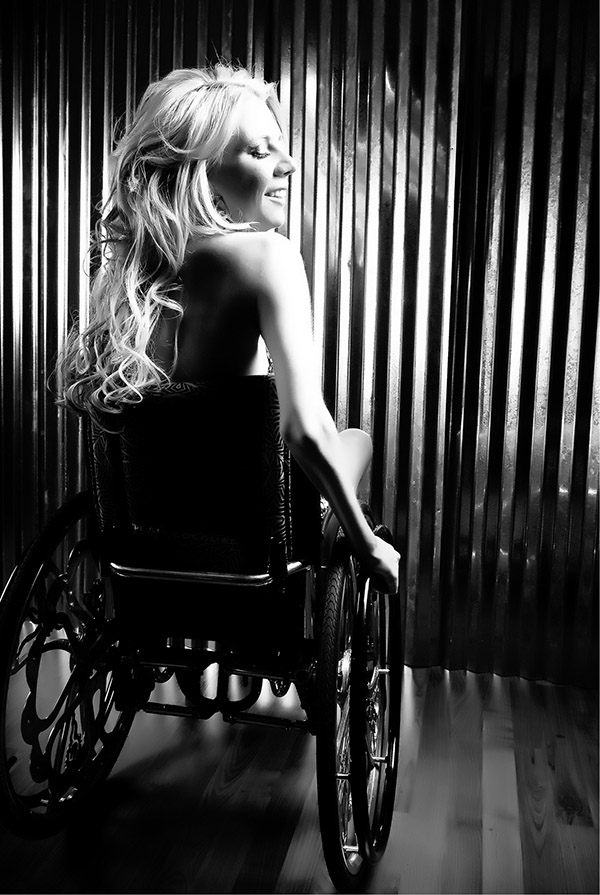
© Revolution Studios of North Carolina
There are so many girl things that are impacted by this chair, such as my desire to be a mother. I face a lot of hurdles, such as weaning myself off certain meds. I have to do that gradually to get ready to have a baby, so that’s hard. I am on pain meds that I don’t want to be on when I am pregnant, but my main concern is the medication that keeps my blood pressure up. It constricts the veins, which isn’t good when blood is trying to get to your baby. In the first two months of pregnancy, the veins need to open up even more. I already have low blood pressure, so imagine taking that medicine away. What might happen in those two months when my veins are open even more? It will be a major challenge. It’s not this difficult with most spinal cord injuries. I have added health issues, and therefore I have to find doctors who specialize in my situation. Even though I am struggling with doctors’ bills, I know my family and Chris’s family will not let anything get in the way, because they want us to have this baby. They’ll support us financially as best they can. Ideally, if I had $80,000, I could have someone else carry it. This would be the best option for me, and I so wish I had the finances to do it, but I don’t. And I would never ask a friend to be our carrier. I don’t want anyone to offer out of guilt. It’s not something anyone I know would be interested in, and I would never put them on the spot like that.
I am afraid of getting pregnant: It’s not bad for the baby, but it’s bad for me. I think my lifestyle change will be dramatic. I won’t move for months. I may be in bed for months, because I likely won’t be able to sit up due to my low blood pressure. When I’m lying down my blood pressure is higher. Sometimes I can’t sit up or I’ll feel like I’m going to pass out. It happens to me now. I have that feeling, and then I just take my meds and lie down and wait for them to kick in. Then I’m usually okay. If I’m not on the medication, as long as I’m lying down, I won’t pass out. Still, even though it would be nine months of hell, this is something I really, really want and something Chris wants, too. I’m not willing to give that up just to avoid being bedridden for a few months out of my entire life.
The hurdle right now isn’t the fear of being in bed; it’s the fear of getting off of my medication. I want a baby now. I wanted it yesterday. But I have to get over that mental block and get off the meds. I’ve had an initial conversation with the doctor and I’m on prenatal pills, which I need to take for six months. So we’re prepping. We’re a year away from trying.
I used to want one boy and one girl, but I’ll probably be able to have only one child. I think pregnancy will be hard on my body, so one will be it for me. And that’s okay. Financially, it will likely be out of reach for us to have more than one. Everyone in my family knows how important this is for us, and they’re going to do everything in their power to help us through.
My girlfriends are so excited. They have told me they are ready to be aunts and to help spoil my child. I think they’re not quite ready to be mothers themselves, so this will be fun for them, too. They’ve all expressed a lot of concern over the way in which I’ll have to exist during the pregnancy, the pain and being stationary, but I think that with them around, I’ll get through it. I know they’re excited because they pretty regularly say, “What’s the status of our niece or nephew?”
Lauren comes from a big family and we’ve talked a lot about kids, but she’s just not ready yet to have a baby. I’m thinking I’ll be the first one of our little group. I’m ready to get started. But she will eventually have children, and we both know it will be fun when we can share that experience. I hope our kids are close friends the way she and I are. I hope all of our kids maintain the bond we all have with each other.

It was an exhilarating feeling being pushed by the ocean like that. I felt free and strong as the wave caught me and carried me to shore. I had never surfed before the accident, just bodyboarded. The feeling was similar. But this time, it felt like more of an accomplishment for me.
People ask me all the time if I’m afraid to go swimming or if I’m afraid of pools or the water in general. I get cold so easily now, so the water has to be really warm for me to go in, like the ocean on a hot summer day, or a therapy pool. But afraid? I’m not afraid at all. There’s really nothing to be afraid of. I’m not afraid of what lies ahead for my life. I carry no grudges and no blame. I have no fear or anger toward the pool. It’s not the pool’s fault or the water’s fault or her fault. It’s one of those things that was no one’s fault. I don’t blame the water or the floor of the pool, and I certainly don’t blame her. It’s also pretty clearly not going to happen again. So, despite it all, I still love the water. I grew up by the water.
I can still feel water on my shoulders and my face when I’m submerged, and there’s a space on the inside of my arms where I can feel it, too. Instead of dwelling on what I can’t feel, I concentrate on what I can feel, the places where I do feel the touch of water. It’s not weird to me anymore, the way it was that night in the pool or when I first showered in rehab, where the water was dripping down from a shower but I couldn’t feel it. I’m so aware and appreciative of the little things that I can feel—the water on my neck, or my wet hair. I love the feeling of the water, the ocean, and the sand. I love it all, still.
Surfing was a dream come true for me. Life got harder for me, but my life is not over. Still, I’d rather surf standing up. I have a list of things I dream of doing one day if a cure ever becomes a reality in my lifetime, things I probably took for granted before the accident. Chris once said it was hard to remember back to when we just walked out and got into the car. I’d give anything to do that again. That, and a lot of other things, too. They aren’t extravagant adventures, but everyday things I barely thought about before the accident. I want to do a cartwheel again, throw a football, and play tennis. I want to bodysurf, dance in my husband’s arms, and climb a tree. Someday, I hope to walk my dog, style my own hair, and do sit-ups.
Mostly, I dream that one day when Chris holds my hand, I will be able to hold his right back.
